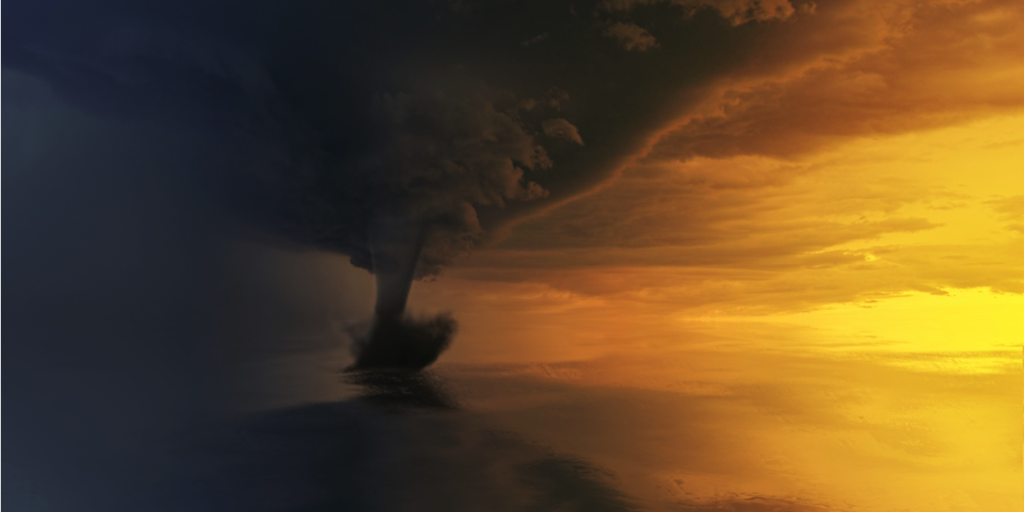Writing for a Storm: Six Moments of Grief and Resistance
As we begin this September edition of Firelight, we mourn the loss of life due to Hurricane Florence in the Carolinas and Typhoon Mangkhut in the Philippines. This month’s curator Sara Wilhelm Garbers offers us six moments of poignant reflection on our changing climate and inspiration for our collective response.
This Month’s Curator: Sara Wilhelm Garbers teaches formation at United Seminary, is a doctoral candidate at Loyola University Chicago, and a feminist activist and pastor. She is writing her dissertation on a theological ethics of memory that centers on the experiences of survivors of sexual assault. You can follow Sara’s work online www.sarawg.com or on Twitter at @SaraWilhelmGarb.
Writing for a Storm: Six Moments of Grief and Resistance
By Sara Wilhelm Garbers
Moment I
I watch the short videos on my Weather Channel app– I watch them in my bed by the glow of my phone at night, barely audible so as to not wake my sleeping partner (Perhaps you too know the ones).
Fires.
Hurricanes.
I huddle there, curled up into myself, much as I did on the night of 2016 when I wept at the news of our new president.
And I suppose I know in my skin what this means, the story it tells.
I wish I had something more to say than this, but right now, as always, am I am left without words.
Moment II
And maybe that’s just it—this act of watching extreme weather represents my nighttime ritual of grief—a silent witnessing that I perform during these barely-waking hours.
When I hold my breath.
And I wonder at what another storm|fire|hurricane|famine means.
And then I re-remember….
Because I know already.
I know what this means. I am afraid of these symbolic manifestations of the earth crying out in its Silent Spring.[1]
And my skin too knows this is true—it whispers a knowing recognition of a planet and of bodies (of all living things) too long pillaged, too long exploited. As if these bodies could be (or are) possible of being sublimated into the way of knowing that ignores that the body, indeed, Keeps Score.[2]
I guess that what I’m saying is that I’ve been weeping and grieving and surviving in many ways in both my own life, and as I listen to the cries of the earth and of my fellow humans.
Moment III
Yesterday I was invited to make a collage in response to Psalm 23:
I made a warrior like Furiosa in Mad Max.
And in her I saw myself | In myself I saw her.
I saw her immediately- my knowing knew and cognized her
As survivor, yet as one who refuses the world as it is and keeps turning towards the myths and the monsters…
At times to confront and resist.
At times to befriend and release.
At times to grieve and weep.
And at times to co-create other worlds of possibility.
Moment IV
Do you know this story, the story of Furiosa in Mad Max?
In a post-apocalyptic desert of a world undone by climate change, people became things as the earth already had. The resources were controlled and scarce and humans became consigned to roles, life and humanity stolen from them.
Furiosa devises a plan to steal the women who were forced to be breeders of the new humans for this desolate land.
She’s taking them to the land of her mothers.
They write on the wall as the exit: “We are NOT THINGS.”
I wear that saying on around my neck on days when I need to remember:
We are not,
this earth is not thing.
It is subject, meaning its own entity in the construction of not only sentence but also in the respect of this: subjectivity resists objectification.
So we say: “We are NOT things. We are not objects for using.”
“This earth is not a thing | some object for using”
And when Furiosa realizes that the land of her mothers is gone, she weeps in a guttural way that is not allowed for a woman on screen.
And after the weeping: they go back to the place they ran from.
They return to overthrow the one who cosines all to be things in a universe of scarcity and objectification.
And when this happens, well… there is water enough for all to drink.
Moment V
And maybe this is it:
That as I sleep and watch the news of storms in a fetal position, my body knows something of what it needs—for the womb I fashion as I grieve, it nurtures me. Indeed, the wombs they nurture us as we sleep and move into the darkness.
And then we awake in the morning, and by doing so we bear ourselves into life once more.
And in this new day we then co-create and midwife a world with one another in which water is for us all.
Moment VI
I suppose this doesn’t solve climate change in itself, but it gives me resolve-
To resist
To create
And to work for a world where we
listen to our bodies, we
listen to each other, and we
listen to this earth.
So for tonight, I write in the midst storm, and I remember.
We write in the midst of the storms.
The world is crying out its silent spring. May we keep writing and resolving and co-creating anew.
[1] See: Carson, Rachel. Silent Spring. New York: Houghton Mifflin, 1962. (https://en.wikipedia.org/wiki/Silent_Spring)
[2] See: van der Kolk, Bessel. New York: Penguin, 2015.



